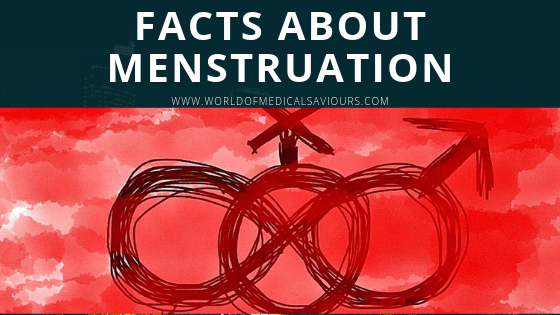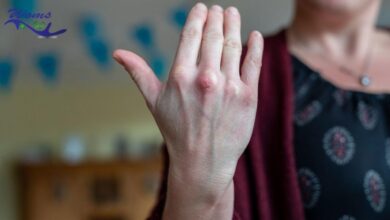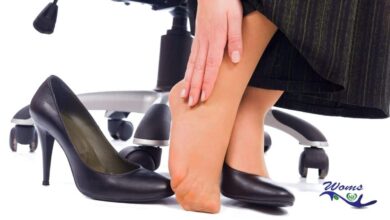Facts about menstruation [Myths and Facts]

Menstruation is very natural for Females. But we should know the facts about menstruation for awareness! For thousands of years the topic of the “monthly flow” as people call it has fascinated, disgusted and horrified people and with all those beliefs, this much essential topic had become and still is a taboo topic in many parts of the world. ‘On the rags’, as the old term is called stems from the fact that women have been using old clothing (rags) for the use of soaking of the menstrual blood and the history of this has been present from so long such that there is a supposed account of how Hypatia, a 3rd century mathematician is said to have warded off a persistent suitor by throwing her menstrual rag at his face.
And even till today, there are news of how women on their monthly period are subjected to the taboos of their families and ended up losing their lives or about how girls are unable to come to school during their menstruation due to myths, lack of resources such as water, menstruation friendly restrooms and lack of hygiene. Though with the modernization, more and more women have become more comfortable in discussing their periods and coming out with their voice regarding this. However, a lot of people, especially from the rural areas are still in the dark with all their religious and myths. We’ll talk about some of the myths and the scientific facts about menstruation regarding those beliefs.
Myth no.1. Women on their periods should not take a bath:
This myth stems from the thoughts that bathing can cause the bleeding to become heavier and more painful. Of course, if you think about it, it’s not really that sensible. In the olden days, especially those living near the jungles, women who are menstruating would have the smell of blood on them which would make them much more susceptible to attacks from wild predators. Maintaining personal hygiene during this time of the month would not only prevent various infections but the effect of warm water has a soothing effect on menstrual cramps. It is much needed to maintain proper hygiene during this time of the month because that in itself can be a major step in preventing various infections and illnesses.
Myth no.2. Having sex during period:
One of the more common myths surrounding having sexual intercourse while a woman is on period is that a woman cannot get pregnant. This completely depends on the total cycle of menstruation that can differ in different women. Since pregnancy can occur only after ovulation, which occurs midway between the normal cycles, chances are a woman with a shorter cycle can get pregnant. This can be because sperm can survive up to 5 days inside the female genital tract, coinciding with the next ovulation that takes place. Also, while it is not impractical to have sex during menstruation, the matter of hygiene and chances of infection has to be taken into consideration, as women are more susceptible to infections due to hormonal changes at this time.
Source: Plannedparenthood
Myth no.3: Medications during menstruation make it worse:
This myth stems from the olden times, about how medications can make the bleeding heavier or the cramping worse. But because a lot of women suffer from some form of disturbances during their menstrual cycle which can hamper daily life, this can be controlled simply by taking birth control or the hormonal pills. Also, some of the pre-menstrual symptoms that women suffer from can be treated by simply using prescribed medications following a proper visit to the doctor.
Also, read this blog which will give you an idea about Mental benefits of yoga!
Myth no.4: Hesitation in using various sanitary products:
One of the main reasons behind this is the long-standing belief that using menstrual products such as tampons can lead to the rupture of a person’s hymen and thus causing the loss of their virginity. In reality, the hymen is a porous, stretchable covering of the vagina, which may or may not be present in females regardless of their sexual history. Because it is porous i.e., having multiple holes, the menstrual blood can easily pass through the vagina, otherwise, that would result in a condition called “imperforate hymen”, needing a surgical intervention for its cure. Thus inserting smaller objects such as tampons would not cause any damage to the hymen. Also, during menstruation, the vaginal tract is essentially lubricated so insertion can be done without any difficulty. However, care must be taken, as tampons are inserted into the body and can result in a myriad of infection including toxic shock syndrome if left inside for too long. Regular washing of the genitalia and changing of the tampons and pads should be encouraged to prevent any blood-borne infections.
These were some of the myths regarding the beliefs and facts about menstruation. What one must always know is that menstruation is a completely natural process and problems and questions regarding it should never be hidden away. It can be a difficult topic to approach but definitely needs to be addressed. One can follow some of the tips regarding menstruation such as:
- Always be prepared especially if you’re going out on trips. One of the ways to do this is to know and try to understand one’s period cycle, when did the period start, how long did it last, how heavy was the flow and if there were any complications or problems regarding the menstrual period. One can simply use a calendar or a personal diary to keep track of these things, but today it is much easier due to the availability of different menstrual tracking apps available over the internet. As for the preparing part, keep a period bag; filled with necessary pads, tampons, fresh undergarments, pain easing medications, hot packs and foods that can help ease the cramps example: chocolates. This will go a long way knowing that you’re always ready in case the monthly flow does decide to show up.
- Do not be discouraged or afraid to talk about your period problems to your significant other, family and friends. A lot of times problems regarding the period are ignored or simply hidden away due to feelings of uncertainty, embarrassment, or downright fear. For example; women may bleed every day throughout the entire month and not tell the family until life-threatening conditions arise. So always make sure to have someone to open up to and ask for their thoughts regarding the matter at hand.
- A proper checkup done by a professional gynecologist is recommended before starting any medication for the period problems like excess cramping, heavy bleeding, and problematic pre-menstrual symptoms. They will take in account about your menstrual and general history and will provide the necessary treatment accordingly.
- And last but not the least, regarding the conservation of the environment, most of the pads and other sanitary items used today are made of plastic with no way to properly discard or recycle them. Not only does it litter up most of the landfill but also affects the oceans. So the old use of using the ‘rags’ has been coming back into practice but in a more sensible and hygienic way. Pre-produced reusable pads and menstrual cups have been coming into practice, which not only is economic but also helps to save the environment.
Lastly, to prevent the social taboos from taking too much root, young girls, their families and even their schooling system can be educated about the facts, the resources required and how they can be obtained. Like a menstruation friendly education system, availability of water and properly_ disposing sources in the school restrooms as well as emotional and moral support for the girls. Perhaps with all these tips and facts about menstruation, someday women will feel much more confident in regards to their body functions and the traditional taboos can be altered once and for all.




